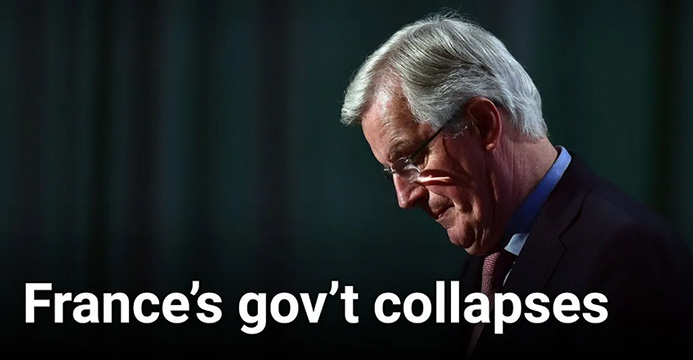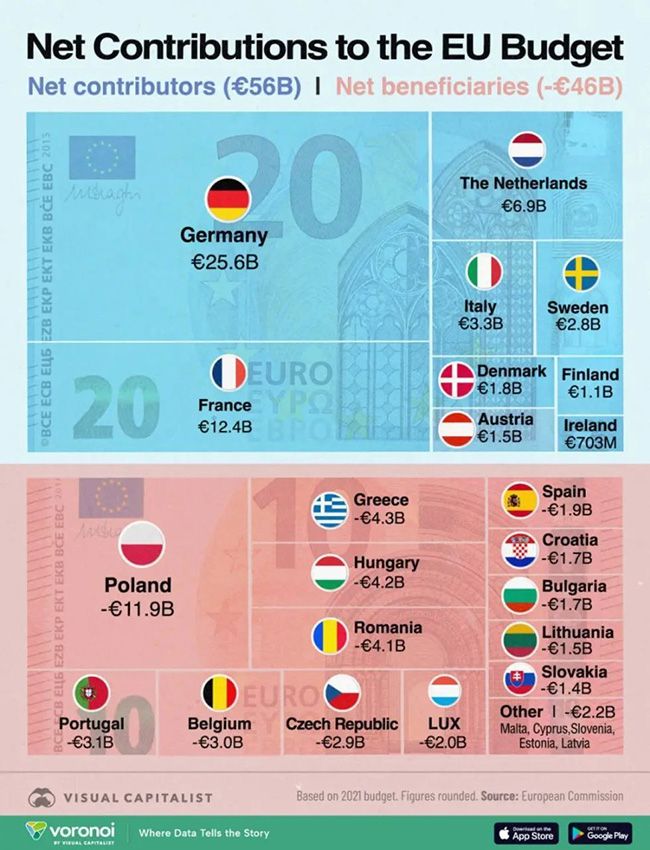
Prime Minister Michel Barnier (photo) will leave office having served the shortest prime ministerial term in modern French history, POLITICO notes.
The collapse of France’s government on Wednesday night means it now finally falls to President Emmanuel Macron to step up and confront a snowballing political and economic crisis that risks sending shock waves across the eurozone.
After a heated debate in the National Assembly — marked by raucous jeers and boos — 331 of France’s 577 lawmakers voted to oust Prime Minister Michel Barnier in a vote of no confidence after he tried to force through an austere budget to fix the country’s yawning deficits.
Once he formally resigns, Barnier will become the shortest-lived prime minister in the history of the modern French republic and the first to be booted out by parliament since 1962.
The political chaos led a growing number of lawmakers to demand the resignation of Macron, whose term lasts until 2027. That would be an almost-unprecedented move in modern French politics.
Speaking before the vote, far-right leader Marine Le Pen said Macron would “sacrifice the fate of France because of his vanity” if he failed to step aside.
“Emmanuel Macron has attacked the foundation walls of the nation for the past seven years,” Le Pen said, earning a round of applause from her troops as they tried to drown out the boos from Barnier’s allies. “He alone can pull the country out of the rut it’s in [with his resignation].”
Mathilde Panot of the hard-left France Unbowed party said Wednesday’s vote was a defeat for “all of Emmanuel Macron’s policies.”
“To break the deadlock, we ask for Emmanuel Macron to go,” she said to reporters after the vote.
As the crisis — largely triggered by Macron’s knee-jerk call for a snap election this summer — mounted to fever pitch, the president stayed on the sidelines.
He arrived back from Saudi Arabia only just before his government collapsed and will now need to take the helm himself, not least by proposing a new prime minister who can right the ship and prove that the EU’s second-largest economy has not become ungovernable.
Barnier himself accused the lawmakers of acting irresponsibility by bringing down his government.
“I cannot accept the idea that institutional destabilization could be the objective that brings together a majority of lawmakers at a moment when our country faces a deep moral, economic, financial and civic crisis,” he said before the vote.
There’s nothing, however, to suggest it would be easier to form a government capable of winning the endorsement of a parliament split three ways than it was three months ago. Dissolution is also not an option, as Macron can’t call new elections until summer 2025.
“This [National] Assembly is impossible,” Barnier told his ministers gathered in the Matignon palace after the vote, according to a participant there who spoke on the condition of anonymity in line with French protocol. “I sincerely wish the next team the best of luck.”
In the immediate term, France must prepare for uncharted territory.
The country will almost certainly enter the new year without a budget, and while Barnier could be asked to stay on as a caretaker and put forward emergency laws, such measures would do nothing to bring down a deficit — currently projected at 6.1 percent of gross domestic product — that has frightened financial markets and drawn rebuke from Brussels.
Brussels and financial markets are watching closely, as Barnier’s debt battle will indicate just how seriously France takes rules designed to ensure the stability of the eurozone. The single currency area has been roiled by previous panics in significantly smaller economies, such as Greece and Spain, so a full-blown French crisis could prove explosive.
If the government fails to pass the budget and collapses, “It won’t only be a political crisis, but a financial crisis,” warned an adviser to Barnier, who was granted anonymity in line with the government’s communication policy.
The ex-prime minister last month proposed draconian spending cuts and tax hikes for next year to reduce the deficit, which reached 6.1 percent of the country’s gross domestic product this year, well above a target of about 5 percent. In 2023, following France’s massive public spending during the pandemic, the European Commission placed the country under an excessive deficit procedure — though outgoing European Economy Commissioner Paolo Gentiloni urged gradual cuts in order to limit the impact on growth.
Barnier’s budget plans have triggered criticism from across political spectrum. The left is accusing him of subjecting France to austerity, while President Emmanuel Macron’s centrists and Marine Le Pen’s far-right lawmakers are attacking him for raising taxes.
…The fall of the French government and the period of uncertainty associated with the absence of a new economic policy from Paris will have strong negative impact on the entire European Union, since France is one of the main donors to poorer countries within the EU. European solidarity is in great question: no money – no solidarity...

read more in our Telegram-channel https://t.me/The_International_Affairs

 12:28 06.12.2024 •
12:28 06.12.2024 •






















